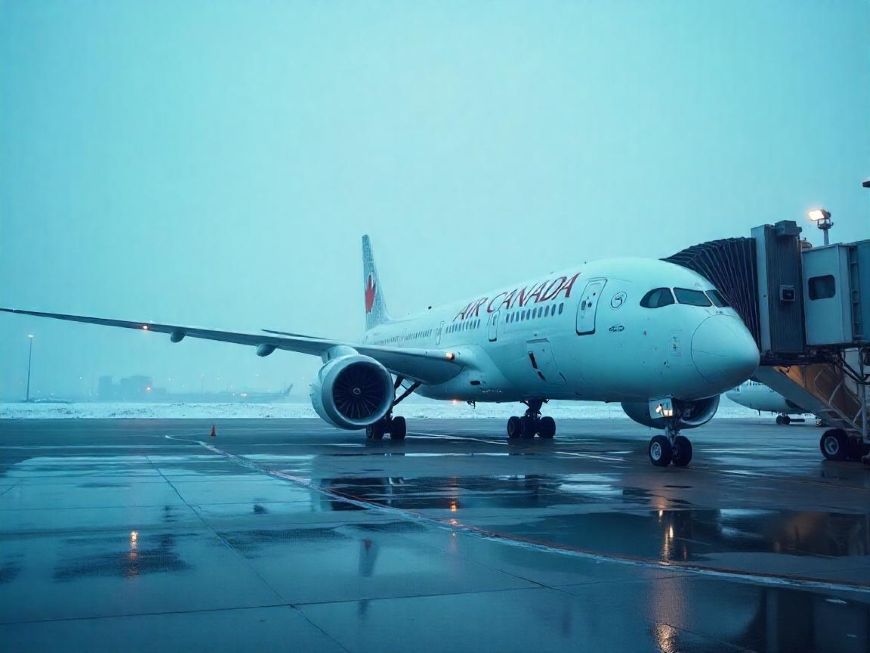Home » AIRLINE NEWS » Air Canada Suspends Toronto-Jacksonville Flight Due to Declining Demand
Saturday, June 28, 2025
In a move that underscores the shifting landscape of air travel, Air Canada has announced it will suspend its Toronto to Jacksonville flight service for the 2025 winter season. The decision to cut this route, effective from November 2025 to March 2026, follows a pattern of recent reductions in cross-border travel. As Air Canada grapples with lower-than-expected demand for flights to the U.S., particularly Florida, it’s adjusting its schedule, with the service expected to resume in summer 2026.
Why Is Air Canada Cutting the Toronto-Jacksonville Route?
Air Canada’s decision to suspend the Toronto to Jacksonville route highlights the airline’s ongoing adjustment to weaker demand for cross-border flights between Canada and the U.S.. Originally, the airline had planned to operate daily winter flights on this route, utilizing the Bombardier CRJ 900, a regional jet with a capacity of 76 passengers in three classes: business, economy plus, and economy.
However, the airline now believes the demand simply isn’t there, especially during the winter months, prompting the flight’s temporary cancellation. The decision is a reflection of the broader industry trend of shifting travel preferences and a changing political climate, which has led to declining passenger numbers on cross-border flights, particularly between Canada and the United States.
Changes in Cross-Border Air Travel
The trend of declining air travel to the U.S. from Canada has become more apparent in 2025, with government data showing a 14% decrease in Canadian flights to the U.S. in April and a 24.2% drop in May. These figures coincide with a shift in public sentiment in Canada following political events. Many Canadians are now opting for destinations within Europe and Asia, shifting their travel patterns away from the U.S.
The Toronto to Jacksonville flight reduction is a direct response to this change in cross-border air travel, where airlines are increasingly scaling back services to meet lower demand. Sun Country Airlines, Flair Airlines, and Air Transat are also among the carriers significantly reducing their U.S.-bound services.
The Bigger Picture: Reduced Flight Capacity
While Air Canada has made cuts, other airlines are adjusting their schedules as well. For example, United Airlines has increased its capacity on flights between Canada and the U.S. by 3.9% in 2025. Similarly, Alaska Airlines and Porter Airlines have also expanded their schedules by 14.5% and 15.1%, respectively. However, increased flight schedules do not necessarily translate into higher demand or full flights—the load factors remain a concern for many airlines.
Overall, while some airlines have reduced their flight schedules, others have expanded, leading to a competitive landscape where airlines are constantly adapting to changing passenger preferences and external factors, such as economic uncertainty and geopolitical influences.
Air Canada’s Strategy Moving Forward
The suspension of the Toronto-Jacksonville route is part of a larger strategic adjustment by Air Canada to focus on more profitable routes and adapt to fluctuating demand. By temporarily scaling back less popular flights, the airline can optimize its resources and adjust its fleet usage. The CRJ 900, which was previously in operation on this route, will likely be reallocated to other, higher-demand services, helping the airline maintain its competitive edge.
Though the Toronto-Jacksonville service will be suspended for the winter, Air Canada remains committed to its long-term growth, particularly in North American and European markets. Cross-border travel will continue to play a key role in its operations, but the airline must now navigate the reality of lower demand and adjust its offerings accordingly.
Conclusion: A Changing Landscape for Air Travel
Air Canada’s decision to cut its Toronto-Jacksonville route speaks volumes about the ongoing shifts in air travel patterns. While some airlines continue to grow their cross-border services, others are scaling back. The political climate and fluctuating demand are driving these changes, and Air Canada’s strategy reflects the evolving nature of the aviation industry.
For travelers looking to visit Florida, alternatives are available through other routes, but Air Canada’s decision marks a significant moment in cross-border travel—one that signals a broader transformation in the way people travel and the way airlines adapt to market realities.
«Enjoyed this post? Never miss out on future posts by following us»
Tags: Air Canada demand 2025, Air Canada suspension, Airline News, Canada, cross-border travel cuts, flight cancellations, Toronto Jacksonville flight, Tourism, Tourism news, travel industry, Travel News
